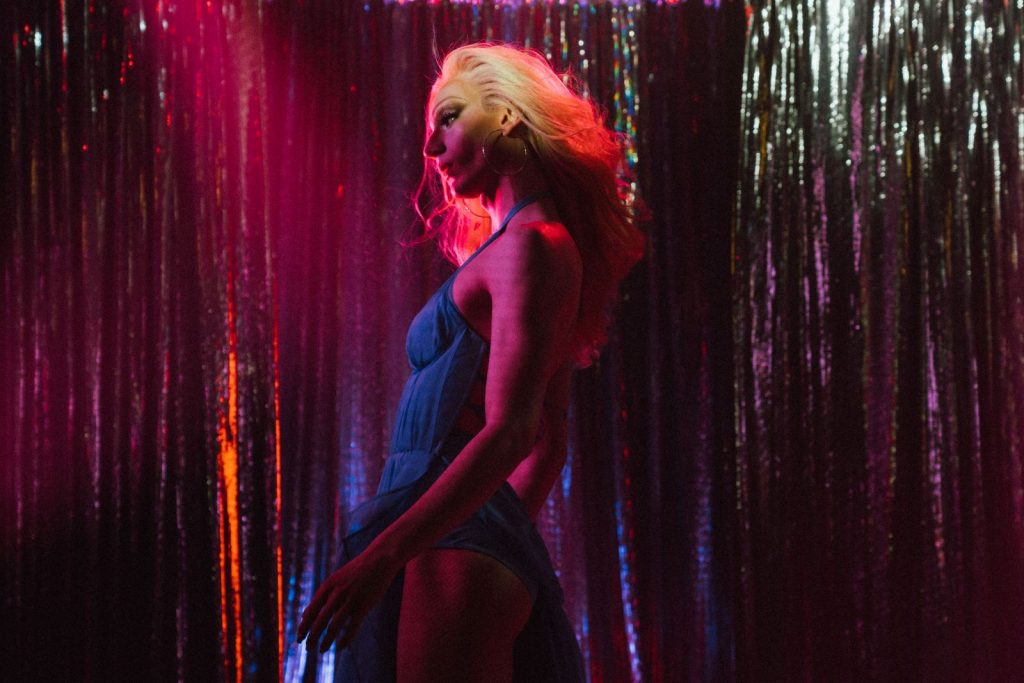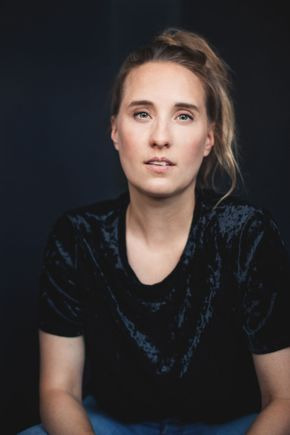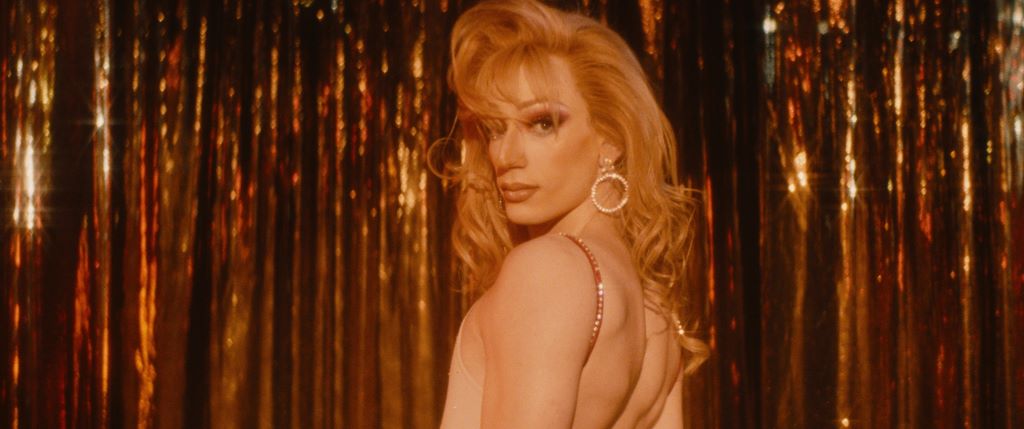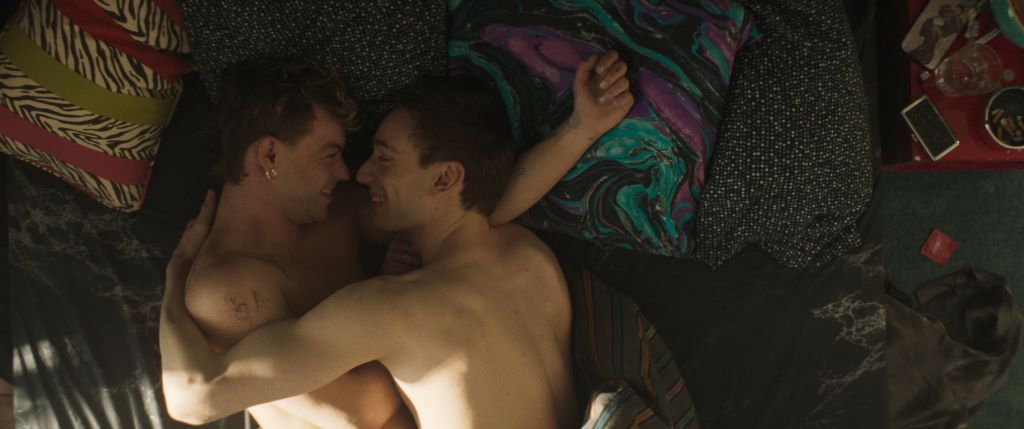Reviews include Superman, Apocalypse in the Tropics, and To a Land Unknown.
Sophie Dupuis on Solo and Filming Queer Joy
February 25, 2024

By Rachel Ho
Like millions of people across the country, Sophie Dupuis became properly obsessed with RuPaul’s Drag Race, watching every season, some even twice. “I fell in love with the art and the political aspect of it,” the Quebecois filmmaker recalls.
Thanks to RuPaul, Dupuis began exploring the culture of drag, and became inspired to set her latest film, Solo, in that world. Starring her now-frequent collaborator Théodore Pellerin (a runner-up for TFCA’s inaugural Outstanding Performance in a Canadian Film award) and French actor Félix Maritaud, Solo explores the passionate highs and destructive lows of a doomed relationship, unravelling a fraught love affair before our eyes.
Dupuis’ interest in the drag world not only influenced her decision to use and celebrate Montreal’s vibrant scene, but has developed into something of a mantra for the filmmaker: “Sometimes, if I’m having trouble in my life, I think, ‘What would a drag queen do?’
“[They] saved lives, they get to know themselves through their characters,” Dupuis continues, considering the ways drag culture enriches individuals and communities as a whole. “It’s a philosophy, and it’s something that we really need in our society right now.”
Following the success of Solo, including winning Best Canadian Film at the 2023 Toronto International Film Festival where it premiered, I sat down with Dupuis over Zoom to discuss her working relationship with Pellerin, her directing style and how Solo has changed her life and others. Solo is now one of three dramas nominated for the TFCA’s Rogers Best Canadian Film Award alongside Matt Johnson’s BlackBerry and Ariane Louis-Seize’s Humanist Vampire Seeking Consenting Suicidal Person. The award carries a cash prize of $50,000, courtesy of Rogers, with the runners-up each receiving $5,000.
Rachel Ho: I was really touched by the essay you wrote for the CBC in September, particularly how being on the Solo set with this group of people made you feel accepted. If it’s not too personal, would you mind sharing more about that feeling and experience?
Sophie Dupuis: We [had] a lot of queer people behind the camera who were not feeling free to be themselves in the world or on other sets. And on this one, they were all feeling free to be themselves. I remember — and I know that I can tell this story because Jean Marchand [who plays Frida] has been telling this to everybody — he really discovered how he hid himself all his life. I think [when he was younger], people were not as open as today about queerness and so he hid himself. When he saw all those young actors and all the queer extras in the bar scene, he saw all these people being free and he burst into tears. He said that he always knew he was a gay actor, but now he was a queer actor.

This movie changed his life and his way of approaching his queerness and at the same time, I saw everybody behind the camera feeling that queerness, too, in a different way. I think that was the day that I understood that I felt at home. All those weeks of rehearsals that we did with Théodore and Félix, we talked a lot about relationships and sometimes the boys were telling me that my reflection was a heteronormative reflection. I understood I needed to deconstruct all of this in my head and in my heart.
I’d love to talk more about this heteronormative reflection. Coming from this perspective, where did the inspiration or desire come from to make not just a queer film, but one where everything just exists within this culture without the trauma we typically see?
I must admit that when I wrote [the film], I never thought about it. For me, it was just a love story between two men. I never thought about the family maybe not accepting their orientation or the artistry of drag. I think it’s kind of the world I would like to live in.
I [now] understand that for a lot of people, [Solo] was special that the queerness of the characters wasn’t the problem in the film. When I was writing, I thought that all this homophobia and transphobia was behind us. I was a bit naive. This was before all those things were happening with drag queens in the United States. I really thought that we were more evolved. Making the film was kind of a reality check and it was a nice gift to the community to give them a film that is not about, “Oh no, I am gay. What I’m what I’m going to do! Will my family still love me?”
What an incredible experience to get that reality check while making this movie, but also in turn, like you said, making a film that serves as a gift to the queer community by celebrating their uniqueness without glorifying it.
It’s funny, I get a lot of comments from people who are around 60 years old, and are themselves parents, telling me, “The beautiful thing in the film is the fact that the parents are accepting.” I think they saw themselves in the film or they learned something.
How queerness is celebrated in the film is coming through in a lot of the comments and stories people are telling me. This film has confirmed for me how films can change minds and even lives. I really believe that.

I’d like to talk to you about working with Théodore again. How has your relationship changed from your first film, Chien de garde, to working on Solo?
I have this way of working where we rehearse a lot — we try things, brainstorm together, and we rewrite everything together. When we did Chien de garde, I was trying this out, but now on Solo I know how I like to work and he knows too. He says to me that he never feels as free on a shoot [as he does with me], because he knows that I give space to actors and that I want them to participate in the rewriting and questioning. We argue a lot because I want us to argue. I want them to bypass me in their understanding of their characters. At some point, I listen a lot, because I think they know better.
When we were rehearsing, for example, Théodore and Félix came to me. They thought a scene was missing and it was really important to add this thing in their relationship. I was like, “You are right, I’m adding this right now.” That’s the relationship that we have. We collaborate and Théodore really likes that way of working. I admire how he reads a story and understand stuff that I don’t even understand myself.
People always ask me how my characters are so good or how my actors are that good, but I think it’s because I give them this space to be actively involved.
What made you decide to be a director who collaborates with your actors like this?
I didn’t ever decide to do it, it’s just always been my way. I don’t know how to make a film the other way. I don’t understand it. I know we’re directing and communicating our perspective on a character, but actors are living it. There are so many things that we don’t know about — what they’re feeling and understanding and living when they are in the character — and I think that we have to respect that vision.
I met a lot of actors for every film that I’ve done. I work a lot with casting because I want to hear what the actors have to say about a character, what they understand. I’m not choosing an actor or a talent, I’m choosing a vision.

Were you an actor before becoming a director?
When I was young, but no, I don’t think I’m a very good one. [Laughs.] I think I’m just very collaborative. I want them to be free in their creation. I’m confident in my visions, but I think that if I’m listening to other people, it’s just going to be better.
I have to say, this sounds like more of a female trait than male.
I hear that from friends that are working on sets. They experience this often with women, but never with men. [Laughs.]
I guess it’s an ego thing where some people can’t admit they don’t know something or that someone else knows better.
For me there’s so much joy in saying, “Wow, that’s a very good idea. Let’s roll with it!” It really brings me joy.
Solo is available on home video.
The winner for Rogers Best Canadian Film will be revealed on March 4.



